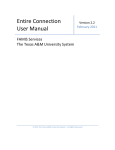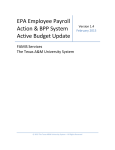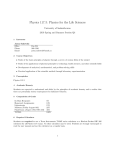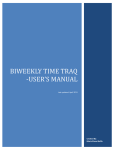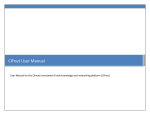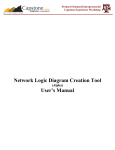Download TTI Motor Vehicle Operations Program
Transcript
Motor Vehicle Operations Program July 31, 2008 Introduction The Texas Transportation Institute (TTI) is committed to providing a safe and healthful environment for its employees and visitors. All activities and work involve some level of risk to people and property. Many activities involve low level risks of a type and magnitude routinely encountered and accepted as requiring no special measures for mitigation. Other activities may involve increased levels of risks and require additional appropriate measures be taken to mitigate such risks. The success of any risk management program is dependent upon each affected person understanding, accepting and adhering to the policies and procedures of this program as well as other agency policies and programs. Purpose The purpose of this program is to enhance awareness of risk levels associated with motor vehicle operations and limit exposure of personnel and property to the lowest practical level of risk through philosophy of risk management, training of personnel, engineering controls and establishment of policies and procedures. The program is also designed to provide all affected TTI employees information needed to safely operate motor vehicles and to provide information regarding emergency and reservation processes. These procedures, when carried out by TTI employees, will help ensure the safe and efficient accomplishment of our work objectives. TTI policies and procedures adhere to the guidelines of The Texas A&M University System (TAMUS) Comprehensive Compliance Plan (for vehicle management per the State of Texas Fleet Management Plan). Nature of Vehicle Use TTI uses fleet (shared/pooled) or researchdesignated vehicles to accomplish many of its objectives. Vehicle use may include, but is not limited to: · Official travel · Work performed in the public rightofway · Interoffice transport Motor Vehicle Operations Page 2 of 11 07/31/2008 · Research and testing · Project and preproject inspection Use of Personal Vehicle for Official Business Fleet and rental vehicles are available for employee use for official business. If an employee chooses to use a personal vehicle for official business, the State Fleet Management Mileage Reimbursement Rate factors in costs associated with vehicle insurance, wear and tear, fuels, oils and lubricants. In the event of an accident, your personal vehicle insurance policy will be pursued. It is your responsibility to confirm with your insurance company that use of your personal vehicle for official business is allowed on your policy. Personal Use/Misuse of Official Vehicles No TTI employee shall use any vehicle owned by TAMUS (including TTI) for any purpose other than official business and there must be an official business reason for the presence of each passenger. Transportation of family, friends or other nonofficial business vehicle occupants is not allowed. Employees may not use such vehicles in connection with any political campaign or for any personal or recreational activity including transportation to and from work on a daily basis; however, a vehicle may be driven to an employee’s home and retained overnight on specific occasions when doing so allows the employee to effect significant time or cost savings or meet a specific outoftown appointment to conduct official business. In cases where significant time or cost savings can be achieved, employees should obtain approval from their vehicle custodian prior to taking vehicles home. Vehicle Checkout/Return Procedures To make a reservation for a vehicle, the following information will need to be provided: · Date/time picking up · Destination · Purpose · Operator(s) Motor Vehicle Operations Page 3 of 11 07/31/2008 · Date/time returning · TTI project number (SL/SA) Once the reservation has been confirmed, the vehicle keys and log book will be available for pickup from the respective vehicle custodian. College Station based fleet (shared/pooled) vehicles are available through TTI Facilities, Safety and Support Services. Vehicle books should contain vehicle and accessory keys, current fuel credit cards, current insurance card, pen and TTI Vehicle Log. If any item is missing, inform the vehicle custodian immediately. When completing the TTI Vehicle Log, operators shall enter the following: · Ending odometer reading · Project number (SL/SA) for which the vehicle is used · Destination/location of vehicle · Purpose for which the vehicle is used · Operator’s last name · Appropriate fuel, oil and maintenance documentation o If any type of maintenance is required on the vehicle, the operator shall notify the vehicle custodian immediately. o On credit card receipts, operators should note the vehicle license number and account (SL/ SA) to be charged. Vehicle operators should, prior to operating the vehicle: · Ensure that the vehicle’s wipers, headlights and turn signals function properly. · Verify proper inflation of tires including spare (no flat or low tires). · Inspect the exterior of the vehicle for damage. · Check the fuel status. Motor Vehicle Operations Page 4 of 11 07/31/2008 · Verify the inspection sticker is current. When returning a TTI vehicle, operators shall: · Ensure the vehicle fuel tank has at least ¼ tank of fuel. Do not return a vehicle “running on fumes” if at all possible. · Park the vehicle in the area designated by the vehicle custodian. · Verify the TTI Vehicle Log is accurately completed (sample provided in vehicle book). · Ensure all credit card receipts are present and contain necessary information. · Note if vehicle received any damages while in use (interior and exterior). · Return vehicle book containing vehicle and accessory keys, current fuel credit cards, current insurance card, pen and TTI Vehicle Log to vehicle custodian. Rules and Responsibilities The following rules and responsibilities apply when employees are using TTI vehicles, but are recommended as best practices for employees using personal or rental vehicles in conjunction with official TTI business. · No one shall use any vehicle owned by TTI for any purpose other than official business, System Policy 33.04: Use of System Property. · Operators shall possess a valid state driver’s license for their vehicle class, System Comprehensive Compliance Plan. · Vehicle operators shall not talk on a cell phone, including the use of handsfree devices, while operating a TTI vehicle, TTI: TTI Rules and Procedures: Pending Rules: Rule Number 34.08.I1. · Smoking is not allowed in TTI vehicles, System Policy 34.05: Smoking. · Firearms shall not be permitted in any official vehicle unless otherwise stated in System Regulation 34.06.02: Firearms. · Do not drive under the influence of alcohol or illegal drugs or allow alcoholic beverages or illegal drugs to be consumed or transported in an official vehicle. Motor Vehicle Operations Page 5 of 11 07/31/2008 · Do not drive under the influence of legal drugs if those drugs could diminish driving abilities or judgment. · Operators shall observe all traffic laws. · Citations for all parking and traffic violations are the personal responsibility of the vehicle operator. · Operators shall drive carefully, safely and courteously. · Operators shall not use radar detectors. · Do not allow passenger behavior that may distract the operator. · Vehicle operators shall ensure that all vehicle occupants in the cab area are properly seated and seatbelts are fastened at any time the vehicle is in motion. · Operators should take precautions to avoid potential incidents (property damage, accidents, etc.). · Do not drive more than eight consecutive hours within a 24hour period. Take extended breaks to remain alert and ensure that operators are well rested. · Operators should maintain a safe driving distance (“safety cushion”) between their vehicle and the vehicles around them. · Operators should respond to adverse driving conditions accordingly (adjust vehicle speed, activate wipers and/or lights, etc.). · Operators shall properly use vehicle signal devices to alert other drivers of their intended path of travel. · Turn on the vehicle headlights: o Prior to dusk o At night o Any time conditions indicate that increased visibility is needed (to see or to be seen) · Parking lights are not considered legal operating lights while in motion. Use headlights if increased visibility is needed. Motor Vehicle Operations Page 6 of 11 07/31/2008 · Operators should be aware of all railroad crossings and do not try to circumvent any railroad safety measure such as flashing gates and signs. · Do not position vehicle so as to obstruct the view of any traffic sign or signal or in any manner that creates a safety hazard. · If the vehicle is equipped with a flashing beacon, the beacon should be used unless its use would negatively impact the project or would cause undue hazards to oncoming traffic. · Operators should follow manufacturer’s gross vehicle weight guidelines to avoid dangerously overloading vehicle. · Operators should become familiar with the vehicle’s equipment and its safety precautions. If necessary, reference the vehicle’s user manual. · When exiting the vehicle to perform work on the public rightof way, the operator shall ensure that all occupants are wearing the proper personal protective equipment (PPE), as required. · When possible, park the vehicle in a position that would allow the operator to pull forward out of a parking space. If an operator must back a vehicle: o If feasible, exit the vehicle and inspect the area in which you intend to back up. o When available, use a guide outside of the vehicle to assist you. o Slowly back up, checking behind you and using the mirrors often to avoid accidents. · Operators should remove keys and lock the vehicle when not in use to prevent vandalism or theft. · Occupants should sit in or ride on a vehicle in accordance with the vehicle’s design and prescribed traffic laws. · Operators should wash the vehicle exterior, as needed, to ensure safety and appropriate representation of TTI while on the road. Motor Vehicle Operations Page 7 of 11 07/31/2008 Driving Habits (for fuel efficiency) · Plan travel routes prior to beginning a trip. · Avoid overfilling the fuel tank. This will reduce fumes, wasted fuel and possible safety hazards from spillage. · When driving over 40 miles per hour, keep the windows rolled up (if feasible). At higher speeds, the vehicle’s air conditioning system will work more efficiently if the windows are closed. · Avoid excessive idling. · Avoid rapid accelerations. Roadside Safety · In the event that a TTI vehicle should become disabled, all measures should be taken to prevent damage, theft or vandalism. · Move the vehicle to a safe location away from traffic, if possible. If the vehicle cannot be moved, do not stand near the vehicle. · Raise the vehicle hood and engage the vehicle hazard lights (flashers) to alert others of the situation. · Remove all agency and personal property, or as much as possible, before towing. Roadside Assistance During official business hours, call TTI Facilities, Safety and Support Services at 9798456595. That office will coordinate with the vehicle operator any necessary assistance including towing. After hours, for vehicles originating in the College Station area, call the TAMU Physical Plant Communications Center at 9798454311. That office will coordinate a wrecker service locally or outoftown to return the vehicle to the TAMU Transportation Center in College Station. Note: Urban offices will need to secure towing services with a vendor in the area, but should notify TTI Facilities, Safety and Support Services of any vehicular situation. Motor Vehicle Operations Page 8 of 11 07/31/2008 The Texas Department of Public Safety (DPS) has a tollfree number, 18005255555, for motorists to use in the event of a nonemergency, nonlife threatening situation. Customers of participating wireless companies (ALLTEL, Nextel, AT&T Wireless, and Verizon Wireless) may dial *DPS (*377) free of airtime charges anywhere in Texas and receive roadside assistance for nonemergency situations. DPS will assist motorists in the same manner as dialing their non emergency tollfree number. Ø Please note that the DPS will not send a tow truck at the State’s expense. DPS will assist or refer you to the appropriate law enforcement agency. Accidents The term “Accidents” is used in this program in correspondence with the State Fleet Vehicle Management Plan and the TAMUS Comprehensive Compliance Plan. If a TTI vehicle is involved in an accident, these procedures should be followed: · Call police (911) or local emergency number. Inform the person to whom you are speaking that you are in a State vehicle. · Take necessary steps to prevent any additional accidents. · Move the vehicle to a safe location away from traffic, if possible. If the vehicle cannot be moved, do not stand near the vehicle. · Render aid to the injured until help arrives. Provide first aid, as appropriate and trained. · Do not make any statement, oral or written, as to WHO was at fault. Any admission of fault may impair the insurer’s ability to defend a case of questionable legal liability. The appropriate legal authority will decide fault or liability. While the operator’s signature is required if a traffic citation is issued, the signature does not constitute an admission of guilt, it indicates that the operator has read and understands the charge. · Record the names, addresses, telephone numbers and license numbers of any persons involved in or witness to the accident. Record insurance information from all involved. Motor Vehicle Operations Page 9 of 11 07/31/2008 · Provide all required information to the law enforcement officer. · While at the scene, secure all information needed to complete the following forms (found in the emergency section of the vehicle book): o TAMUS Motor Vehicle Accident Report to be submitted to the TTI Business Office o Employer’s First Report of Injury or Illness to be submitted to TTI Safety Office (they will forward to TTI Human Resources) Seek assistance from the law enforcement officer for needed information. Do not leave blank spaces. · Obtain the police report case number to provide to the vehicle custodian, who is required to obtain the police report to submit for insurance matters. · All accidents within the state of Texas that involve the injury or death of any person or damage of property exceeding $500 must be reported to the Texas Department of Public Safety. This report must be made within 10 days of the accident by means of a Driver’s Confidential Accident Report provided by the police officer. · Call TTI Facilities, Safety and Support Services at 9798456595 to report the incident. They will advise the appropriate Business Office staff for insurance and claim purposes. · Do not discuss the accident with anyone other than the responding law enforcement and the TTI Facilities, Safety and Support Services or Business Office representative. Motor Vehicle Operations Page 10 of 11 07/31/2008 Life Safety and Emergency Response Dial 911 for ambulance, fire and police. From a phone system that requires you to dial a “9” prefix, dial 9911. · Provide the 911 dispatcher with the following information: o o o o · Location of emergency If there are any injuries, describe type of injury, if known Brief description of injured person (gender, age, etc.) Your name and phone number (in case you are disconnected or the dispatcher needs additional information) If an ambulance is not needed: o Render first aid, only as trained. o Assist with transportation of employee to their personal physician, if appropriate. · Make injured as comfortable as possible do NOT move injured person unless directed by the 911 dispatcher (or if injured person is in immediate danger). · Employees, an event witness or the employee’s supervisor shall complete an Employer’s First Report of Injury or Illness form to report any work injuries. Only facts, not opinions, should be stated on the form. · Any time a safety issue arises, employees shall contact the appropriate supervisor immediately. Additional Information · The TTI Safety Office can assist with arrangements for personnel safety training in various areas and assist with written safety protocols. · The TTI Safety Office shall review this program, at a minimum, on an annual basis. · The TTI Safety Office is responsible for updating and maintaining this program with comments from the TTI Safety and Environmental Council. Motor Vehicle Operations Page 11 of 11 07/31/2008











